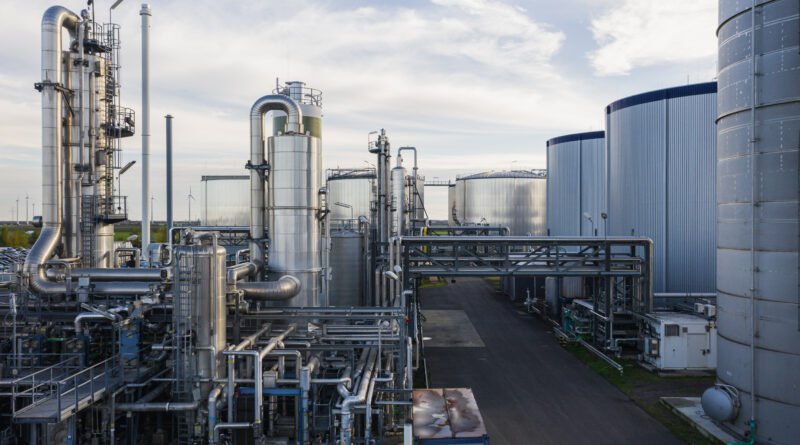Green lights for advanced biofuels
In the financial year 2020/21 VERBIO Vereinigte BioEnergie AG reached the next milestone in the history of the Group: for the first time the Group’s sales revenues exceeded one billion euros.
Significant factors such as the commencement of the internationalisation of VERBIO AG, the implementation of the RED II directive into German law, good margins in the Biodiesel and Bioethanol segments, and the strong demand for advanced biomethane from distillation waste and straw all contributed to the 17.6 percent increase in sales revenues, which totalled EUR 1.026 billion in the year just ended (previous year: EUR 872.4 million). Earnings before interest, taxes, depreciation and amortisation (EBITDA) increased by 36.2 percent to EUR 166.3 million, EUR 44.2 million ahead of the very good results achieved in the previous year. In the middle of the financial year (in December 2020) the VERBIO share was promoted to the SDAX, and the value of VERBIO AG has increased five-fold within the space of one year.
Compared to the previous year, the total production of biodiesel and bioethanol increased to 834,541 tonnes (previous year: 796,411 tonnes). The capacity utilisation was 90.7 percent. The volume of biomethane production also increased to 794,817 MWh compared to 784,414 MWh in the financial year 2019/20.
The lights are green – both nationally and internationally
“It was a tremendous year for VERBIO. For the first time we have broken through the ‘sound barrier’ of one billion sales revenues annually, and again we have increased our EBITDA by a significant amount. But it is not just a matter of our numbers; the framework conditions also demonstrate that we are on the right track. The greenhouse gas reduction quota in Germany is due to increase from 6 percent currently to 25 percent in 2030, and the demand for advanced biofuels will soon be many times the size of the conventional biofuels market. We see similar trends in other European states. Finally, the formulation of ambitious European climate protection objectives is being followed up by concrete action and clear implementation requirements. The transport sector has the biggest backlog with respect to emissions, and accordingly the targets for this sector are particularly ambitious,” said Claus Sauter, Chairman of the VERBIO Management Board. “We at VERBIO have been waiting for this for 15 years. Finally, the time has come. We are ready.”
BioLNG as a growth market
The increased demand for renewable fuels, a large number of new laws, requirements and subsidy programmes for renewable fuels coming from the German government, low-emission vehicles for heavy goods transport on the roads, the exemption from tolls for heavy goods vehicles powered by CNG/LNG fuels, and the introduction of a CO2 duty on fossil energy sources will all have a positive effect on the market environment from 2022. These developments will be driven forward at the European level by the “Fit for 55” programme proposed by the EU Commission. The reform of energy taxation will play a major role here; fuels and powertrains will in future be taxed based on their energy content and environmental performance (greenhouse gas emissions). Credits towards meeting greenhouse gas quotas will no longer be awarded for fossil natural gas from 2022. This will generate further demand for renewable advanced biofuels.
Biomethane has made its breakthrough for use as a fuel in the heavy goods transport sector; BioLNG will be a global mega trend. “Currently 10 percent of newly registered articulated trucks in Germany are powered by gas engines. We are surprised that LNG power is the significant leader here, although there are currently only 70 public LNG filling stations across the country. With the construction of a large-scale liquefaction plant for 60,000 tonnes of BioLNG at the Zörbig location and the construction of up to 20 VERBIO-owned LNG filling stations, we aim to make use of the potential offered by this growth sector. This means that in future we will cover the entire value added chain, from capturing raw materials to filling the tanks of heavy goods vehicles,” said Claus Sauter.
Comprehensive investment programme to expand existing locations
Currently VERBIO produces biofuels from renewable raw materials and advanced biomethane from distillation waste and straw at its Zörbig, Bitterfeld, Schwedt, and Pinnow locations, as well as in the growth markets in North America and India. As a result of a comprehensive investment programme, VERBIO’s capacity for the production of biodiesel, bioethanol, and biomethane in Germany will be expanded massively by the end of 2023. In this there will be a focus on advanced biofuels produced from residual and waste products listed in Annex IX to the RED II.
In the USA, too, our biomethane capacity will be expanded from 20 MW to 80 MW. There the Group is implementing the VERBIO biorefinery concept at the Nevada/Iowa location. In future the raw material for the biomethane plant will include residual waste from the production of bioethanol (distillation waste) in addition to straw. The biorefinery in Nevada is scheduled for completion by the end of 2022. Also in the USA, VERBIO plans to open a global trading desk for advanced biofuels, in particular for advanced biomethane.
There are also further new marketing opportunities for bioethanol, biodiesel and biomethane resulting from the increasing decarbonisation of the chemical, steel and cement industries, and from the CO2 reduction targets in air and shipping transport.
VERBIO technology for the decarbonisation of the chemicals industry
With the construction of the world’s first ethenolysis plant, VERBIO will commence operations in the dynamic field of decarbonisation in the chemical industry. The technology, which has been developed by VERBIO, uses a catalysator developed by XiMo, the Group’s Hungarian subsidiary, and it is intended that this catalysator will be manufactured on an industrial scale in future. Using the ethenolysis plant we will manufacture, on a non-fossil basis, three new products based on rapeseed oil methyl ester to be used as raw materials in various speciality chemical applications. In addition to the ethenolysis plant in Germany, an industrial-scale catalysator manufacturing facility will be built in Hungary.
Always one step ahead of the market
In total, VERBIO plans investments of almost EUR 300 million by mid-2023. “VERBIO has always been one step ahead of the market. With our plants in Germany, India and the USA we have a very good foundation that will enable us to access the European, American and Asian markets. For example, we have already entered into a declaration of intent with IndianOil, India’s largest oil company, for the construction of further plants in India. The increasing pace of decarbonisation in new sectors beyond the transport sector opens up many opportunities for VERBIO’s products and technologies,” stated Claus Sauter.
Outlook for the financial year 2021/22
Based on current sales and raw material price levels and the planned production capacity usage (but not making any adjustments for potential effects on results caused by the ongoing COVID-19 pandemic), the Management Board of VERBIO Vereinigte BioEnergie AG expects to achieve an EBITDA for the financial year 2021/22 of around EUR 150 million. Net cash is expected to be around EUR 50 million at the end of the financial year. The Group’s comprehensive investment programme will be largely financed using the free cash reserves generated in previous financial periods and cash flows from current operations.
“The first regulatory markers for meeting the climate targets have been laid down – and there is no way of avoiding VERBIO in this,” concluded Claus Sauter. “We are the largest manufacturer of advanced biomethane in Europe and possibly the world. Biomethane from straw is not only climate-neutral, it is even CO2 negative when the CO2 emissions that would otherwise be released into the atmosphere by leaving straw to rot in the fields is taken into account. We are on the starting blocks ready to expand our internationalisation strategy and to make a significant contribution to decarbonising the world.”




